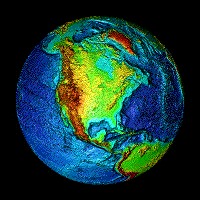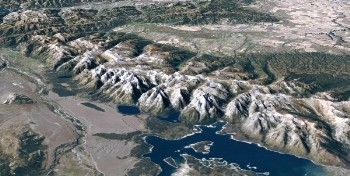

Origin of Mountains and Primary Initiation of Submarine Canyons
 
Origin of Mountains and Primary Initiation of Submarine Canyons |
Origin of Mountains and the
Primary Initiation of Submarine Canyons: A New Concept
 Mountain systems characterized by folding, such as the
Teton Range of the Rocky Mountains, have been the intensively studied and
debated since the 19th Century. The age-old problem of fold-mountain formation
reduces to this question: How can one account for the “extra” surface area,
contained within the continental boundaries, that observations reveal folded
atop other layers?
Mountain systems characterized by folding, such as the
Teton Range of the Rocky Mountains, have been the intensively studied and
debated since the 19th Century. The age-old problem of fold-mountain formation
reduces to this question: How can one account for the “extra” surface area,
contained within the continental boundaries, that observations reveal folded
atop other layers?
For decades,
in the plate tectonic view, mountain-building has been attributed exclusively to
plate collision, which is thought to “elongate” the continent, whereas in the
Earth-expansionist view, it is uplift from beneath with gravity sliding and
gravity spreading. In a paper published in the May 25, 2012, issue of Current
Science, J. Marvin Herndon deduces “a more fundamental, general consideration from Earth’s early formation
as a Jupiter-like gas giant”.
 Contrary
to the planetesimal theory, the article asserts, Earth’s complete,
protoplanetary condensation initially formed a gas-giant planet virtually
identical in mass to Jupiter. T-Tauri outbursts by our young Sun, Herndon
posits, stripped the gas from the inner four planets. A rocky Earth remained
that had been compressed to about 64% of present diameter by the 300 Earth-mass
weight of primordial gases. As described in the article, the subsequent
whole-Earth decompression caused changes in surface curvature, leading to
“extra” continent area that acted to “flatten” itself, to reduce need for
increased surface area by “buckling, breaking, and falling over upon itself”.
This buckling, breaking, and falling over upon itself, Herndon asserts, is the
principal agent involved in the formation of fold-mountains.
Contrary
to the planetesimal theory, the article asserts, Earth’s complete,
protoplanetary condensation initially formed a gas-giant planet virtually
identical in mass to Jupiter. T-Tauri outbursts by our young Sun, Herndon
posits, stripped the gas from the inner four planets. A rocky Earth remained
that had been compressed to about 64% of present diameter by the 300 Earth-mass
weight of primordial gases. As described in the article, the subsequent
whole-Earth decompression caused changes in surface curvature, leading to
“extra” continent area that acted to “flatten” itself, to reduce need for
increased surface area by “buckling, breaking, and falling over upon itself”.
This buckling, breaking, and falling over upon itself, Herndon asserts, is the
principal agent involved in the formation of fold-mountains.
The article
proffers the additional suggestion that decompression-generated, peri-continental
tension-fractures, “initiated the formation of submarine canyons and drainage
channels; later, erosion-processes did the rest”.
Origin of mountains and primary initiation of submarine canyons: the consequences of Earth's early formation as a Jupiter-like gas giant. (click here for pdf) Current Science, 2012, 102, 1370-1372.